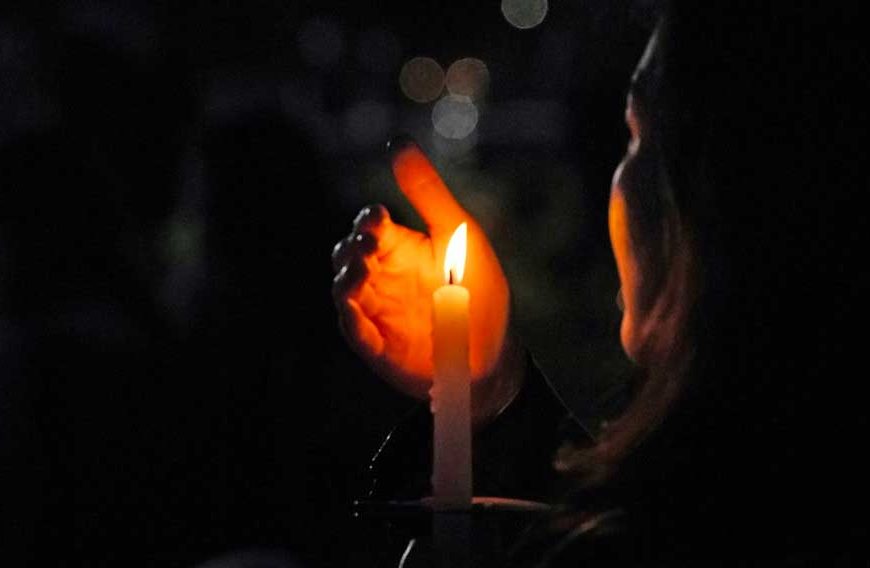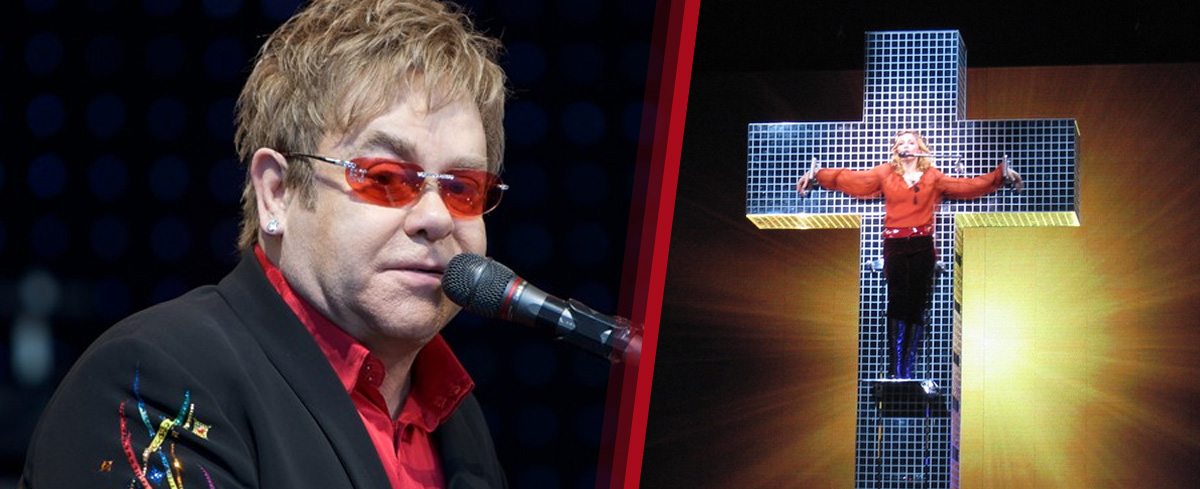Because God exists, and because we are all made in his image, that means all people are inescapably religious. We all are made to worship, and if we refuse to worship the one true living God, we will worship something or someone else – often ourselves. And during the past few centuries political or secular religion has certainly come to the fore.
The state takes the place of God and demands the worship that he alone deserves. As Fulton J. Sheen put it in his 1943 book, Philosophies at War: “The choice is not between religion and no religion, but between two religions: a religion from God or a State religion; a religion with a Cross or a religion with a Double Cross.”
Or as R. J. Rushdoony said in Christianity and the State:
Not only is every church a religious institution, but every state or social order is a religious establishment. Every state is a law order, and every law order represents an enacted morality, with procedures for the enforcement of that morality. Every morality represents a form of theological order, i.e., is an aspect and expression of a religion. The church thus is not the only religious institution; the state also is a religious institution. More often than the church, the state has been the central religious institution of most civilizations through the centuries. . . . [T]he real issue is not between church and state, but is simply this: the state as a religious establishment has progressively disestablished Christianity as its law foundation, and, while professing neutrality, has in fact established humanism as the religion of the state. When the religion of a people changes, its laws inevitably reflect that change and conform themselves to the new faith and the new morality.
The obvious political religions of recent times have of course been Communism and Nazism. But as I mentioned above, this has been happening for several centuries now. We also have to go back to 1789 and the French Revolution to see the real beginnings of this.
And that revolution had its ideological origins in the Enlightenment. Consider just one important Enlightenment figure, Rousseau and his classic work, The Social Contract. There we find the state and the “common good” taking priority over the individual. As philosopher Stephen Strehle put it:
Within this concept of the state, Rousseau sets the basic agenda for the French Revolution and its left-wing political tendencies, defining the individual in terms of the state, equivocating over property rights, subsuming all citizens under a central government, and prescribing utilitarian or revolutionary means to inculcate the common interest, often at the expense of individual liberty.
And the Revolution itself was decidedly anti-Christian, especially during the Reign of Terror of September 1793 to July 1794. A full-scale program of de-Christianisation was unleashed. Countless churches were closed and church properties were confiscated; thousands of priests were killed; a new revolutionary calendar replaced the old Christian Gregorian calendar; education was taken away from the churches and handed over to the state; streets were renamed to eliminate references to saints and kings; a “goddess of Reason” was set up in the Notre Dame Cathedral, and so on.
This was a radical war on Christianity. As historian Ian Shaw writes:
In France, the Jacobin view that all clergy were suspect gained ground, and that Christianity should be exterminated in the name of revolutionary humanism. An attempt was made to overturn a Christian nation in the name of rationalism. Although the de-christianisation policy was conducted by a minority, and did not last long, a powerful blow had been struck against the seeming inviolability of the church. It was a chilling foretaste of what was later to come elsewhere in the twentieth century, when again Christians were to face persecution by totalitarian regimes which sought to deny people the right to autonomous personal thought or religious life.
And the French Revolution helped to pave the way for more modern versions of political religion. The two major ones I have already mentioned: Communism and Nazism. A pair of excellent volumes by a noted English historian can be noted here. Michael Burleigh writes eloquently and incisively about political religion.
Here I can merely look at the Introduction to the first of these works, and provide a few quotes on how others have discussed this idea of secular religion. Burleigh spends some time on the important thinker Eric Voegelin and says this:
Voegelin’s aim was to show that Communism, Fascism and National Socialism were not simply the product of ‘the stupidities of a couple of intellectuals in the nineteenth and twentieth centuries . . . [but] the cumulative effect of unsolved problems and shallow attempts at a solution over a millennium of Western history’. In his initial stab at these problems, he ventured much further back in time. The crucial distinction he made in his short 1938 book The Political Religions was between ‘world-transcendent’ and ‘world-immanent’ religions, or in other words the false worship of earth-bound fragments of the former. It was the difference between a god and an idol….
Voegelin was certainly concerned to show that ‘political religions’ were a decadent product of secularisation, but he also believed they were an anthropological necessity, in which the religious ‘instinct’ would always out, merely with another content camouflaged in (symbolically related) guises. In short, he was updating the history of idolatry, in line with George Bernard Shaw’s pithy comment that ‘The savage bows down to idols of wood and stone; the civilised man to idols of flesh and blood.’
Another figure he discusses is Catholic intellectual, Christopher Dawson:
In his 1935 Religion and Modern State, Dawson traced the rise of the modern imperial state which sought to colonise areas of existence that ‘the statesmen of the past would no more have dared meddle with than with the course of the seasons or the movements of the stars’. This applied, Dawson claimed, to the benignly soft totalitarianism of the modern bureaucratic welfare state, as well as to the malignly hard police states of Communists and National Socialists. Politics replicated the absolutist pretensions of religion, enveloping ever wider and deeper areas of life in the political, simultaneously constricting the private. Like a Church, such movements orchestrated hysterical enthusiasm and mass sentimentality, while dictating morality and taste, and defining life’s ultimate meanings. Unlike Churches, they also tried to suppress religion itself, pushing Christianity into the hitherto unaccustomed role of defending democracy and pluralism. Using more accessible language than Voegelin, Dawson saw that “this determination to build Jerusalem, at once and on the spot, is the very force which is responsible for the intolerance and violence of the new political order . . . if we believe that the Kingdom of Heaven can be established by political or economic measures – that it can be an earthly state – then we can hardly object to the claims of such a State to embrace the whole of life and to demand the total submission of the individual…”
So much more can be said about these important themes, but we have to draw things to a close. My main point is this: today in the West it is political religion that dominates and/or seeks to raise its ugly head. Christianity is once again under full-scale assault, just as it had been over 200 years ago in France.
The need for Christians to resist the state-as-God narrative is absolutely vital. And if we do not learn from history here, we will simply find ourselves living under a new reign of terror. Three key quotations are worth featuring here in closing:
“The secularists have not wrecked divine things; but the secularists have wrecked secular things, if that is any comfort to them. The Titans did not scale heaven; but they laid waste the world.” G. K. Chesterton, Orthodoxy (1908)
“Whoever strikes against God strikes down himself. The atheist denying God degrades himself. The atheist exalting himself above God sinks below the level of animate and inanimate beings. Liberation from God is enslavement in creatures. Absolute humanism is the sure road to absolute despotism. Denial of God as truth begets the imprisonment of man in the self-imposed darkness of his own myths.” Vincent Miceli, The Gods of Atheism (1971)
“There are two kings and two kingdoms in Scotland: there is King James the head of this commonwealth, and there is Christ Jesus the King of the church, whose subject James the sixth is, and of whose kingdom he is not a king, nor a lord, nor a head, but a member.” The Scottish Covenanter Andrew Melville (1545-1622) speaking to King James VI of Scotland, who later become King James I of England. For daring to speak this way, he spent four years as a prisoner in the Tower of London.
References
Burleigh, Michael, Earthly Powers: The Clash of Religion and Politics in Europe, From the French Revolution to the Great War. HarperCollins, 2005.
Burleigh, Michael, Sacred Causes: The Clash of Religion and Politics, From the Great War to the War on Terror. HarperCollins, 2006-2007.
Shaw, Ian, Churches, Revolutions and Empires. Christian Focus, 2012.
Strehle, Stephen. The Dark Side of Church/State Separation: The French Revolution, Nazi Germany, and International Communism. Routledge, 2014, 2017.



















